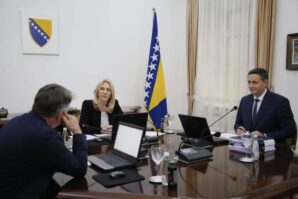
The coronavirus pandemic is proving to be a disaster for small and medium-sized enterprises across Europe, particularly for those in the south and east of the bloc and their non-EU neighbours.
Most EU countries have taken some form of measure to protect businesses from the effects of the coronavirus crisis, according to Novinite.
The most widely used is the deferral or reduction of tax and social security contributions and earlier repayments of tax refunds.
But the exact application of these measures varies, as demonstrated by the cases of Hungary, Bulgaria and nearby Bosnia-Herzegovina.
Lopare is located in the north of Bosnia-Herzegovina.
The small town has bad road connections with the rest of Bosnia and its geographical position makes it difficult for export-oriented companies to manage their logistics.
Around 5000 people from Lopare have migrated to Western Europe to work and there is fear, if the economy goes down, that more will do the same.
If the Covid-19 crisis destroys the economic structure of this town, which has a population of 10 thousand, it could become a ghost town.
Around 1300 people work in ten, small and medium-sized enterprises. Half of them are at risk of losing their jobs.
Most companies are export-oriented, doing mostly workbench-production for EU countries such as France, Austria, Switzerland, Germany and the Netherlands. In particular, Lopare produces yachts, textiles, radiators and heating systems.
The mayor of Lopare, Rado Savić was one of the first to call on the State authorities to intervene immediately.
The municipality has a very modest budget and it cannot directly help its economy: there is no budget available for financial injections.
His team wants help for the business sector, such as state guarantees for salaries during the crisis.
But if the government do not respond, the municipality is ready to act to save jobs by taking a bank loan or restructuring the local budget.
“The State has to intervene and make a fund to help employers so that they clearly know they can keep their workers and that they do not have to pay social contributions throughout the state of emergency,” says Savić.
With 90 per cent of the economy in Lopare export-oriented, it is dependent on components and raw materials that are imported and dependent on exporting the final products.
Zvjezdan Maksimovic and his wife are worried: Will they be able to pay back the 15-year bank loan they signed last year to buy their apartment in Lopare?
For two years the 34-year-old worked at Termal, a local plant producing heating systems. But due to the coronavirus crisis, he was laid off.
He says it is now impossible to find any work. His salary was his only source of income and if the crisis continues the only solution is to find some agricultural work or a day-to-day job.
“Now we can register at the unemployment bureau. I don’t know if we are going to get any payment from them until some official notice. My wife is still working. She will have some salary. So, I hope we will be able to cover at least our basic expenses,” says Maksimovic.
Regional authorities promised an emergency scheme that could provide between 150 and 200 euros per month through regular unemployment benefits, depending on the size of the salary.
But unlike countries such as Germany, where the state started to pay small or big businesses immediately, in Bosnia-Herzegovina there is no functional plan on how to start implementing the scheme.
The country has many administrative levels, with each promising something and doing nothing.
In the north, the authorities of “Republika Srpska” said they would fund around 250 million euros (500 million Bosnian Convertible Marks) but they don’t yet have the money.
In the other half of the country, there is also nothing in place yet, but authorities have promised to restructure the budget and immediately release 125 million euros, (250 million BAM) to support economic activity.
And at state level, it has yet to be decided if VAT payments should be moved to the end of the month or not.
The most concrete measure enabling people to actually get money into their accounts is that bank loan payments will be delayed for at least three months for individuals and companies that are not working.
On the other hand, the European Union has pledged more than 80 million euros to Bosnia as part of the overall Western-Balkan Cover-19 support package worth 410 million euros.
This money will be implemented through different international agencies like the United Nations Development Programme and covers health (7 million) and socio-economic sectors (73 million).
Mahir Hamzić is the general manager of Termal which was once the biggest and most well-known radiator and heating system producer in Yugoslavia.
Usually, 100 workers build heating systems here but now the place is almost empty.
“This morning, when I woke up, I thought: is this for real? Or just a dream? It took me one, two minutes to get it. The situation is really really bad,” says Hamzić.
“Most of the components we need are made in Italy (…) That’s the biggest problem today and that’s the reason why we can not go on producing.”
But he doesn’t yet fear that the company could crash down completely:
“We are people coming out of a war, 20 years ago… we know how to struggle…”
“It’s about money, that’s all: We need (financial) support from the state, from the European Union, from our government.”
















